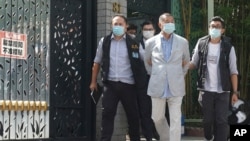One year ago this week, Hong Kong authorities raided Apple Daily’s offices and arrested the pro-democracy news outlet’s founder, Jimmy Lai.
Lai’s arrest was one of the first under the new national security law. The regulation — enacted to bring stability to the city following the 2019 anti-government protests — has been widely criticized as a threat to Hong Kong’s once-vibrant free press.
Under the security law, subversion and foreign collusion are prohibited. But the way in which the law has been interpreted is putting news outlets on tenterhooks. Some journalists say they are concerned that reporting seen as criticism of the Hong Kong or China government may result in prosecution.
Apple Daily’s experiences have compounded those fears.
After 26 years in business, the pro-democracy newspaper was forced to close June 24 after authorities arrested more of its top executives for alleged foreign collusion and froze the company’s financial access.
At least six Apple Daily executives and reporters have been arrested or charged under the national security law.
Lai, who already is serving two sentences in relation to anti-government protests in 2019, is awaiting trial under the national security law. If convicted, the 73-year-old could be sentenced to life in prison.
Since the closure, some reporters and at least one news outlet, Initium Media, have announced they are leaving.
Initium Media didn’t directly link its move to Singapore to the law, but in a letter to readers last week said, “The road to freedom has become a harder and harder one.”
Initium Media declined to comment when contacted by VOA. Hong Kong’s Security Bureau did not respond to VOA’s request for comment.
Hong Kong Chief Executive Carrie Lam has defended the national security law, saying previously that it would target only a minority and that the Apple Daily case was about “a suspicious act of endangering national security” and not about media freedoms.
So far, one person has been convicted and at least 100 people have been arrested under the law.
Media hardship
After printing a final edition, all members of the Apple Daily newsroom staff lost their jobs.
In a phone interview with VOA, former reporter Alvin Chan said he still could not come to terms with the situation. “Even now I can’t believe the whole company, the whole newspaper, disappeared,” he said.
Chan said the closure has been a “trauma.” The media outlet employed up to 1,000 staff members, he said, and he is concerned that other news groups may be discouraged from offering them jobs because of whom they used to work for.
So far, Chan has been provided some work at news website Stand News, but it’s only one day per week.
“[I’m] jobless. Unemployed. I hope I can still be a journalist, but the actual situation in Hong Kong, in the media, after the Apple Daily shutdown, I believe there are only a few media companies that are willing to employ the reporter from the Next Media,” he said, referring to Apple Daily’s parent company Next Digital.
“It’s political," Chan said. "Most of the Hong Kong media have different political views, different political agendas, and it's quite against the journalists in Apple Daily, and I don’t believe they will try to employ some of our colleagues."
Ronson Chan, deputy assignment editor at Stand News, has said that isn’t the case for his company. “We have some new members from Apple Daily, around four to six persons. I don’t think we have any special consideration,” he said.
Although the editor doesn't get involved in hiring, he said, "I don’t think hiring any Apple Daily staff will take any risk.”
Founded in 2014, Stand News describes itself as a pro-democracy news website.
During the protests of 2019, several of its reporters were injured, including journalist-turned-activist Gwyneth Ho. She was one of 47 people accused of subversion under the new law in February.
The media news site has been touted by some as another target for authorities, but Chan told VOA last month that Stand News' editorial policy is sticking to its “mindset” and “principles.”
“From my understanding of the law and the police operation, I don’t think we have a problem with our news reporting," Chan said.
Still, Stand News last month removed some commentaries, op-eds, blogs and reader contributions from the website, widely seen as a precautionary move.
Long-term fears
Hong Kong authorities have said 30 articles published by Apple Daily were evidence the publisher conspired with foreign countries by calling for sanctions against Hong Kong and China.
Reporter Chan is concerned that former Apple Daily journalists may be targeted still if the authorities define their work as breaking the law.
“If they try to redefine the news article as propaganda, then all of my work in the past is propaganda, not news,” he said.
The shifting climate is affecting not just Hong Kong’s private media. Chief Executive Lam announced Monday that public broadcaster RTHK would partner with Chinese state media to “nurture a strong sense of patriotism.”
Media analysts previously have criticized changes implemented under the new government-appointed director of broadcasting, Patrick Li, including the axing of popular shows for alleged bias, contracts being terminated, and Lam's being provided with her own TV segment.
As pressure mounts on the media, a veteran journalist who hosted a former RTHK show and worked as a columnist for Apple Daily left the special administrative region, citing concerns about the reach of the security law.
Steve Vines, who had moved to Hong Kong more than 30 years ago, told the Financial Times that “white terror” — a term used to describe periods of intense repression — is sweeping Hong Kong.







